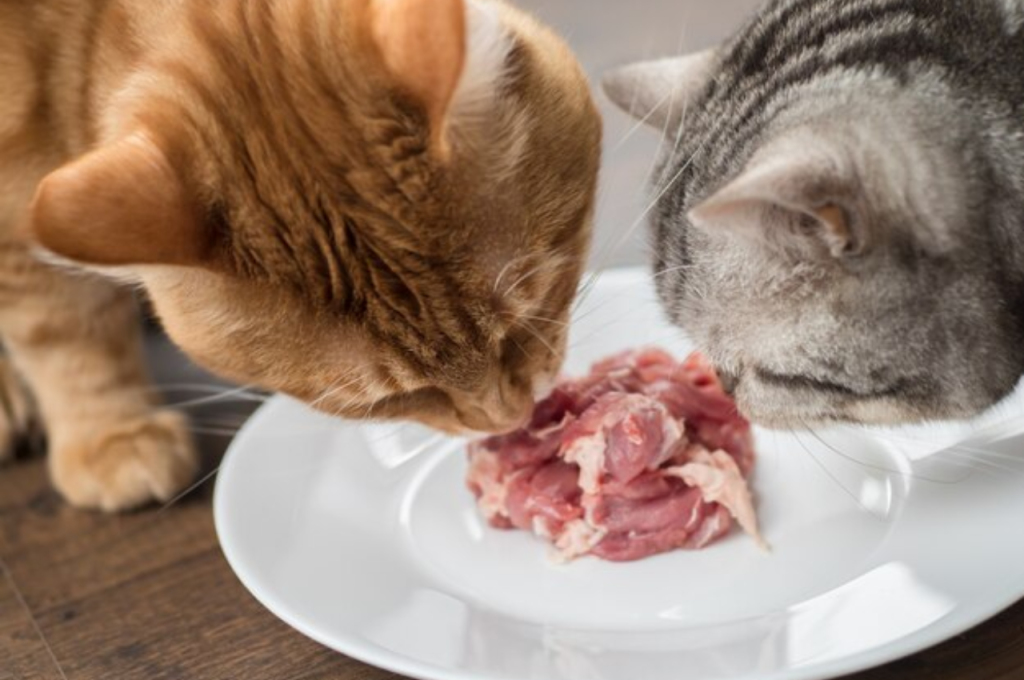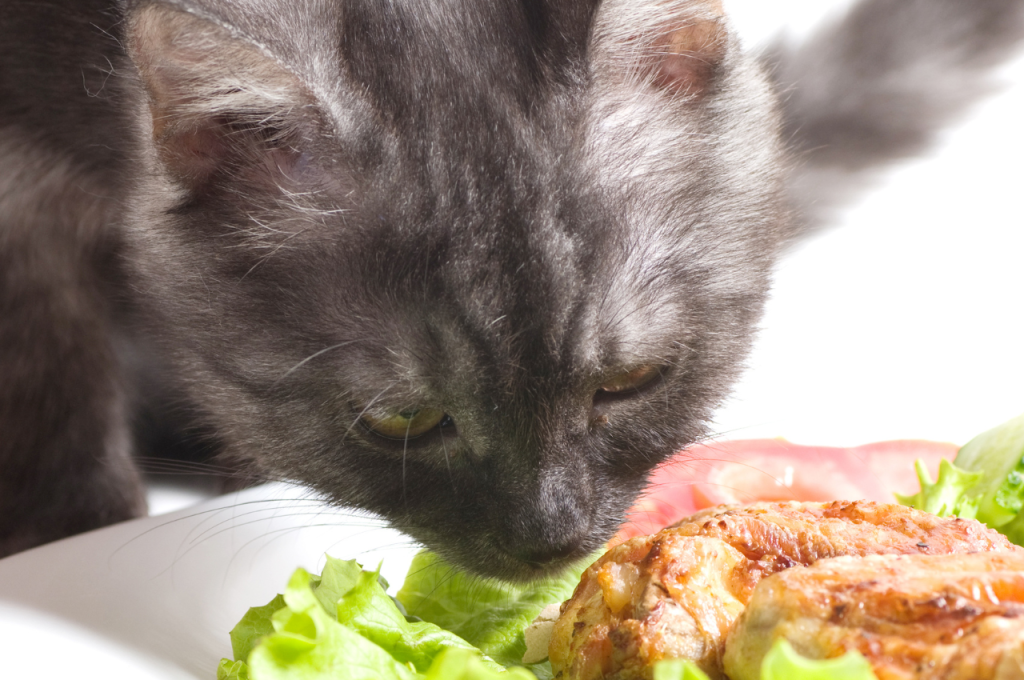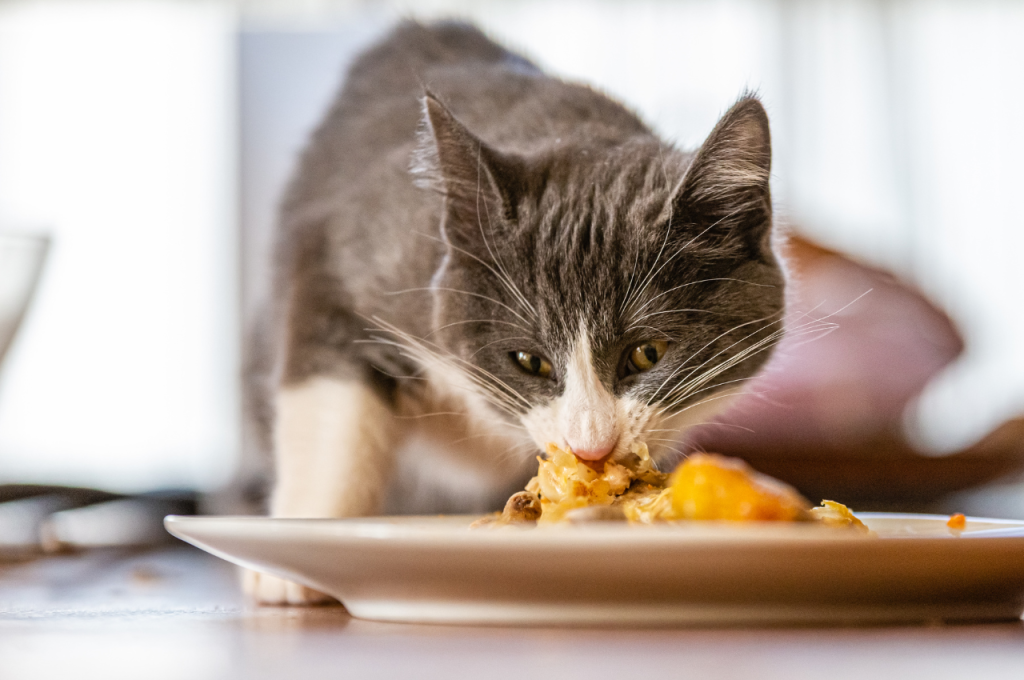Yes, cats can safely eat chicken as it is a good source of protein for them. Chicken is a nutritious option.
If you’re wondering whether it’s okay to feed your feline friend some chicken, rest assured that it can be a healthy addition to their diet. Cats are obligate carnivores, meaning their diet primarily consists of meat, and chicken provides them with essential nutrients such as protein.
Including chicken in your cat’s diet can help support their muscle development and overall health. However, it’s important to ensure that the chicken is cooked thoroughly and free from any seasonings or additional ingredients that could be harmful to your cat. In moderation, chicken can be a tasty and nutritious treat for your beloved pet.
Can Cats Eat Chicken?
Cats can safely eat chicken as it is a nutritious protein source for them. Feeding chicken in moderation can offer several health benefits to your feline friend. However, it’s crucial to understand both the nutritional benefits and potential risks associated with feeding chicken to cats.

Nutritional Benefits of Chicken for Cats
- Rich in protein that supports muscle growth and overall health.
- Contains essential amino acids that are vital for a cat’s well-being.
- Low in calories and fat, making it a healthy option.
Potential Risks of Feeding Chicken to Cats
- Bones in chicken can pose a choking hazard for cats.
- Seasonings or spices used in cooking chicken can be toxic to cats.
- Raw chicken may contain bacteria harmful to cats, leading to digestive issues.
Types of Chicken for Cats
When it comes to feeding your feline friend, including chicken in their diet can provide a good source of protein and essential nutrients. However, it’s important to understand the different types of chicken for cats, including raw and cooked options, to ensure that it’s safe and beneficial for their overall health.
Raw Chicken
Feeding raw chicken to your cat should be approached with caution. Raw chicken can carry harmful bacteria such as salmonella and E. coli, posing a risk to your pet’s health. If you plan to feed raw chicken, consult with a veterinarian first to ensure that it’s prepared and handled safely. Additionally, consider potential alternatives to minimize the risk of bacterial contamination.
Cooked Chicken
Cooked chicken can be a safer option for your cat as it eliminates the risk of harmful bacteria. Cooked chicken provides a good source of lean protein and can be included in your cat’s diet in moderation. It’s essential to ensure that the chicken is plain, without any seasoning or additives that could be harmful to your cat. Always remove bones before serving, as they can pose a choking hazard or cause intestinal damage.
Feeding Chicken to Cats
When it comes to feeding chickens to cats, many pet owners wonder if it is safe and beneficial for their feline companions. Chicken is a popular meat option for humans, but can a cat eat chicken? The answer is yes, cats can eat chicken, and it can be a healthy addition to their diet.
Incorporating Chicken into A Cat’s Diet
If you’re considering incorporating chicken into your cat’s diet, there are a few important things to keep in mind. First and foremost, it is essential to cook the chicken thoroughly and remove any bones before offering it to your feline friend. Raw chicken can contain harmful bacteria like salmonella, which can be dangerous for cats.
When it comes to the type of chicken, it is best to choose boneless, skinless chicken breast. This lean protein source is the most beneficial for cats as it is low in fat and easy to digest. Avoid using seasoned or processed chicken, as it may contain additives or spices that are harmful to cats.
You can serve chicken to your cat in various ways. One option is to boil or bake the chicken and then shred it into small, manageable pieces. This makes it easier for your cat to consume and digest. Alternatively, you can finely dice the cooked chicken and mix it with your cat’s regular food.
Frequency and Portion Control
While feeding chicken to your cat can be beneficial, it is important to exercise portion control and moderation. Chicken should not make up the majority of your cat’s diet but can be given as an occasional treat or supplement to their regular cat food.
A good rule of thumb is to incorporate chicken into your cat’s diet no more than two to three times per week. This helps ensure a balanced and varied diet, providing your cat with essential nutrients from different sources. Remember to consider the size and age of your cat, as portion sizes may vary for different feline companions.
It is crucial to keep an eye on your cat’s weight when introducing chicken into their diet. While chicken is a lean protein source, it still contains calories. Overfeeding can lead to weight gain and potential health issues. If you notice any changes in your cat’s weight or eating habits, consult with your veterinarian to determine the appropriate portion sizes for your cat.
Incorporating chicken into your cat’s diet can be a healthy and delicious addition. However, it is important to follow these guidelines and exercise moderation to ensure your cat’s overall health and well-being.
Signs of Chicken Allergies in Cats
Cats can develop chicken allergies, with symptoms like vomiting, diarrhea, or skin problems. If your cat shows these signs after eating chicken, consult a vet for further evaluation and possible dietary adjustments. It’s important to be aware of potential food allergens when considering a cat’s diet.

Cats, like humans, can develop allergies to certain foods, including chicken. If your feline friend is displaying unusual symptoms after consuming chicken, it could be a sign of a chicken allergy. It’s important to be aware of the symptoms so you can take the necessary steps to address the issue. Here are some common symptoms to watch out for:
Common Symptoms
1. Vomiting and diarrhea: If your cat experiences frequent bouts of vomiting or diarrhea after eating chicken, it could be a sign of an allergic reaction.
2. Skin problems: Skin issues are a common sign of food allergies in cats. Look out for excessive scratching, licking, or biting of the skin, as well as the presence of rashes, redness, or sores.
3. Respiratory problems: Allergic reactions to chicken can also affect your cat’s respiratory system. Keep an eye out for sneezing, coughing, wheezing, or difficulty breathing.
4. Ear infections: Cats with chicken allergies may develop recurring ear infections. If you notice your cat shaking their head frequently or scratching at their ears, or if you detect a foul odor from their ears, it’s time to consult a vet.
Consulting A Vet
If you suspect that your cat has a chicken allergy based on the symptoms mentioned above, it’s crucial to consult a veterinarian. A professional evaluation is necessary to confirm the allergy and rule out any other potential causes of your cat’s symptoms.
Your vet may recommend various diagnostic tests to determine if chicken is the culprit behind your cat’s allergic reactions. These tests may include blood tests, skin evaluations, or elimination diets.
Once your cat’s chicken allergy is confirmed, your vet will provide you with guidance on how to manage the allergy, including a proper diet plan that excludes chicken from their meals. Additionally, your vet may prescribe medication or suggest other treatments to alleviate your cat’s symptoms and improve their overall comfort.
Alternatives to Chicken for Cats
Cats can eat chicken, but it’s not the only protein source suitable for them. Here are some alternatives to chicken for cats:
Protein Sources
Besides chicken, cats can also consume protein from turkey, beef, fish, and lamb. Cats require a high-protein diet, so ensuring a variety of protein sources is essential for their overall health.
Balanced Diet Options
Alongside protein, a well-balanced diet for cats should include taurine, fatty acids, vitamins, and minerals. These components can be found in commercial cat food or homemade meals prepared with guidance from a veterinary professional.

Conclusion
It’s perfectly safe for cats to eat cooked chicken in moderation. The key lies in ensuring it’s free from seasoning and bones. Introducing chicken provides feline companions with a protein-rich option to complement their diet. Remember, consulting a veterinarian and monitoring their reaction is essential.
Happy feeding!
